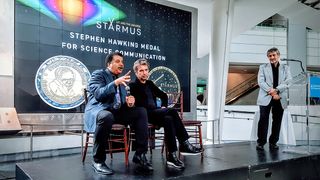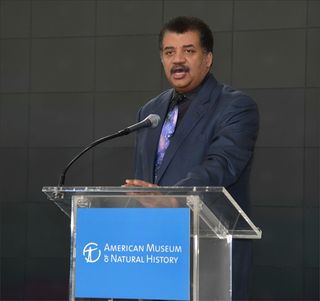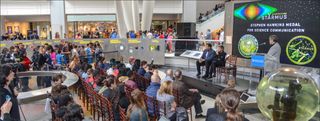Neil deGrasse Tyson Becomes 1st American to Receive Stephen Hawking Medal


NEW YORK — Astrophysicist Neil deGrasse Tyson received the Stephen Hawking Medal for Science Communication Tuesday (June 6), becoming the first American scientist to earn the prestigious award.
Tyson, who refers to himself as "your personal astrophysicist," is most known for his television series "Cosmos: A Spacetime Odyssey" and podcast-turned-television-series "StarTalk." He is the director for the Hayden Planetarium at the American Museum of Natural History here in New York City, where Tuesday's announcement was made.
The Stephen Hawking Medal is an annual award created in association with the Starmus Festival, an international gathering celebrating science and art that will take place in Trondheim, Norway, on June 18-23 this year. Medals are given to science communicators in three categories: writers, musicians and artists, and people in the film and entertainment industry. Hawking, a famous theoretical physicist and author of several best-selling books about the universe, handpicks the recipients himself. [The Most Famous Astronomers of All Time]
Winning in the music/art category this year is Jean-Michel Jarre, a French electronic music composer whose work has been largely inspired by space, technology and science fiction. In the entertainment category, producers of the CBS sitcom "The Big Bang Theory" received the medal.
Previous recipients of the award include physicist and science writer Jim Al-Khalili, the German composer Hans Zimmer, who scored the film "Interstellar," for a lifetime achievement in music, and film director Marc Levinson, for his work on the documentary "Particle Fever."
During the announcement, Tyson said he was "deeply moved not only to be honored at all, but to be honored by Stephen Hawking, who many of us know as the brilliant scientist that he is, but in addition to that fact, he's devoted a huge part of himself to bring science to the public."
Hawking was not present at the announcement in New York Tuesday, but he did make a video appearance on the big screen to personally congratulate the award recipients. Tyson said he'll be "venturing to Norway in two weeks to receive the medal personally from" Hawking at the Starmus Festival.
Get the Space.com Newsletter
Breaking space news, the latest updates on rocket launches, skywatching events and more!
Space.com asked Tyson what he thinks makes for effective science communication, particularly when it comes to controversial subjects like climate science, vaccines and the shape of the Earth (which is definitely not flat). He said the best way to approach discussions like these, in which people either do not understand the underlying science or flat out deny it, is to give people what they need to reach the right conclusion themselves, or "empowering ideas rather than just giving people something else to think.

"Education is not just pouring in knowledge," he added. In other words, good science communicators teach people how to reach the right conclusions through logic and reason, not by simply regurgitating facts. [Boom! Watch Neil deGrasse Tyson Drop Mic on B.o.B's Flat-Earth Theory]
Empowering people to better understand scientific concepts also means making this material accessible and easy to understand. For example, Tyson's latest book, "Astrophysics for People in a Hurry" (W. W. Norton & Company, 2017), breaks down the science of complicated stuff like black holes and quantum mechanics into little nuggets of easily digestible information, making it more enjoyable for more people to read.
Email Hanneke Weitering at hweitering@space.com or follow her @hannekescience. Follow us @Spacedotcom, Facebook and Google+. Original article on Space.com.
Join our Space Forums to keep talking space on the latest missions, night sky and more! And if you have a news tip, correction or comment, let us know at: community@space.com.

Hanneke Weitering is a multimedia journalist in the Pacific Northwest reporting on the future of aviation at FutureFlight.aero and Aviation International News and was previously the Editor for Spaceflight and Astronomy news here at Space.com. As an editor with over 10 years of experience in science journalism she has previously written for Scholastic Classroom Magazines, MedPage Today and The Joint Institute for Computational Sciences at Oak Ridge National Laboratory. After studying physics at the University of Tennessee in her hometown of Knoxville, she earned her graduate degree in Science, Health and Environmental Reporting (SHERP) from New York University. Hanneke joined the Space.com team in 2016 as a staff writer and producer, covering topics including spaceflight and astronomy. She currently lives in Seattle, home of the Space Needle, with her cat and two snakes. In her spare time, Hanneke enjoys exploring the Rocky Mountains, basking in nature and looking for dark skies to gaze at the cosmos.
